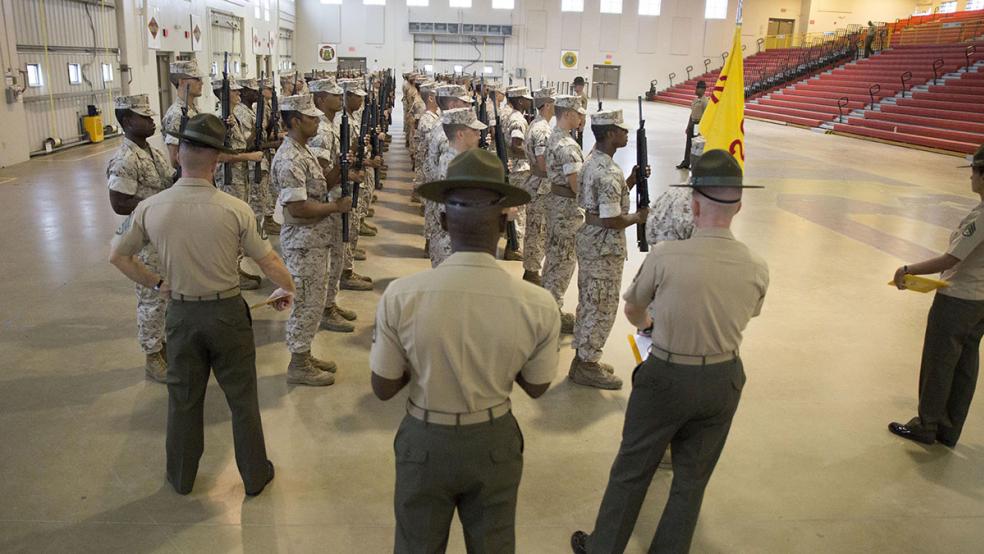For decades, American military leaders – including generals and admirals recently retired -- have been in broad agreement about staying above the political fray, especially in election years.
But like so many other traditions cast aside like highway litter in this crass and crazy race to the White House, the military’s code of studied silence is being tossed out the campaign bus window.
Related: Here’s What Happens If Trump Decides to Quit
In a letter to the editor published by The Washington Post last weekend, General Martin Dempsey, former chairman of the Joint Chiefs of Staff, criticized the appearances of two former generals at the political conventions last month.
“The military is not a political prize. Politicians should take the advice of senior military leaders but keep them off the stage,” Dempsey wrote. “The American people should not wonder where their military leaders draw the line between military advice and political preference. And our nation’s soldiers, sailors, airmen and Marines should not wonder about the political leanings and motivations of their leaders.”
Dempsey said that former Army Lt. General Mike Flynn, who appeared at the Republican National Convention, and former Marine General John Allen, who spoke at the Democratic National Convention, were both out of line.
Flynn, forced out as director of the Defense Intelligence Agency in 2014, said America needs to “wake up,” and he denounced “the reckless rhetoric of an Obama clone like Hillary Clinton” and the “willful ignorance and total incompetence” of the current administration.
Allen, former deputy commander of U.S. Central Command and chief of American forces in Afghanistan, was surrounded by a platoon of ex-soldiers in civvies as he spoke forcefully in support of Hillary Clinton. He said under her command, “international relations will not be reduced to a business transaction,” adding “I also know that our armed forces will not become an instrument of torture, and they will not be engaged in murder, or carry out other illegal activities.”
Related: Trump Slams US Military Strength, Swoons Over Russian Forces
No question, they were fighting words from fighting men. But that’s what galls Dempsey.
“They were introduced as generals. As generals, they have an obligation to uphold our apolitical traditions,” Dempsey said. “They have just made the task of their successors — who continue to serve in uniform and are accountable for our security — more complicated. It was a mistake for them to participate as they did.”
Dempsey is definitely old school, and he is to be commended for trying to protect a tradition that American military leaders hold dear. But in this critical election, as American faces an ever more dangerous world, is he right?
Certainly, active-duty military leaders need to button it and follow the orders of the commander in chief. That is crucial to maintaining the country’s deep faith in its warriors as apolitical instruments of defense and pillars of democracy.
The alternative is a banana republic where disgruntled generals roll tanks onto the White House lawn, surround Capitol Hill and replace the Supreme Court with puppets.
If military leaders don’t like the orders that come down, they can turn in their stars and return to civilian life, or if they resist directives, as General Douglas MacArthur did, they can be forced to fade away.
Related: Trump Wants to Add to the War on Terror’s $4 Trillion Price Tag
But when their uniforms are hung in a closet for good, military leaders have a right – and in many cases, a duty – to share their views with the American people they served.
In Trump’s case, the public should know what the professionals think about the prospect of the Pentagon taking orders from someone who sidestepped the draft during the Vietnam War because of “heel spurs.”
And as voters assess Clinton, a supporter of the disastrous intervention in Iraq, a read on her from generals like Allen and General Stanley McChrystal, who worked with the former secretary of state, might help inform their opinion.
It’s doubtful that General Dempsey would argue that Dwight Eisenhower shouldn’t have run for president, which is about as deep into the political process as it gets.
So why shouldn’t generals and admirals who carried out decisions that put their lives and their troops’ lives on the line try to influence the choice of who is best qualified to make those calls in the precarious future?
Offering advice and support to candidates is the right of any officer, as Dempsey said in an op-ed for DefenseOne, “But they should speak privately, where it will not be interpreted that they are speaking for us all.”
But there is a time to shut up and a time to stand up.
This is a time when the nation needs the leaders of the institution it trusts the most to speak in a loud voice.






